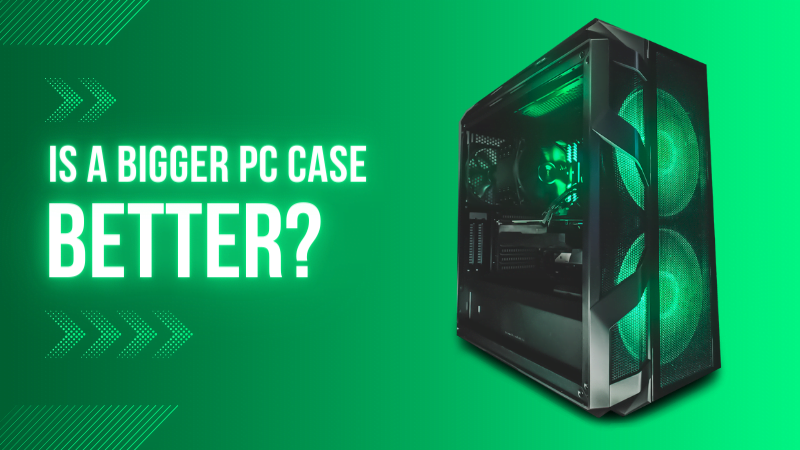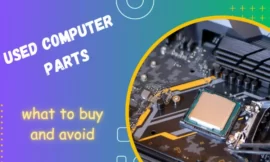is a bigger PC case better? You probably want to build your own gaming pc so you think a larger tower is better? In this article we will know everything about that so let’s start.

When you see an average computer case you may notice that they are big in size and absolutely massive Do you think that this is necessary the truth is that most PC cases are larger than necessary!
Table of Contents
Toggle1. Is a bigger PC case better?
First and foremost, no one insists you buy a small computer case if it’s not your preference. In a free country, you have the right to choose a massive SUV even if it means maneuvering it into compact spaces. Similarly, if you’re all about making a big statement with your PC gaming setup, go ahead. And if you want to build a workstation as large as a data center, nothing’s stopping you!
I’m addressing those who may not realize they can enjoy the same performance with a more compact PC. Space is valuable for many, whether working or gaming, and a smaller computer offers several benefits:
Here’s an extended version of the text with more details:
- Portability: The compact size makes it a breeze to move around, providing flexibility in your setup.
- Desk-Friendly Design: With a smaller case, your tower can conveniently sit on your desk, optimizing desk space and accessibility, as opposed to being placed on the floor.
- Cost-Effective Choice: Smaller cases are often more budget-friendly than their larger counterparts, which can be a prudent choice for those mindful of expenses.
- Aesthetic Appeal and Discretion: The reduced size not only minimizes the visual impact but also offers the advantage of easy concealment, making your setup less conspicuous and seamlessly integrated into your space.
If you value space, cost, and minimalism, opting for the smallest case that fits your current and future needs is wise.
2. Mini ATX motherboards Are Good for Almost Everyone
These days, motherboard choice doesn’t significantly affect performance. When opting for a compact motherboard to fit a smaller case such as mini atx the main limitation is expansion. You might have fewer slots for RAM, SSDs, or PCIe, but for most users, 2/4 RAM slots, one PCIe 16x slot, and two NVME SSD slots suffice. USB ports are usually plentiful, especially if you pick a motherboard with built-in Bluetooth and Wi-Fi, saving space.
3. Save space with SSDs and nvme!
PC cases are often bulky due to accommodating large mechanical hard drives and standard 3.5-inch drives. If your computer relies on NVME SSDs or 2.5-inch drives, no need to reserve space for these larger drives. An NVME-only system doesn’t require drive bays as SSDs attach directly to the motherboard.
if your computer is slow learn with me how to detect if your computer has a Bottleneck!
4. Graphics Cards Determine Your Case Length
In modern desktop PCs, especially gaming rigs, the largest component is the graphics card. It’s a power-hungry component, second only to the CPU, and requires substantial cooling. Your case must be bigger to fit the card you want. This seems to challenge the case for smaller PCs, but there’s more to consider.
The disparity in size between a flagship GPU like the RTX 4090 and the next-tier card is immense. When we consider the GPUs that most people actually purchase in comparison to what a standard case can house, there’s typically a significant amount of underutilized space. Furthermore, various board partners produce GPU variants that are notably more compact, albeit slightly wider. Generally, if you’re in the market for a colossal $2000 GPU, you’re well aware of it. If you decide to opt for such a behemoth in the future, the additional expense of a new case pales in comparison.
5. Design and Style
Your PC case’s aesthetics matter, especially if it’s on display. Choose a case that aligns with your style preferences and the overall theme of your setup.
6. Cable Management
Well-organized cables not only look better but also improve airflow. Opt for a case with cable management features like routing holes, tie-down points, and ample space behind the motherboard tray.
7. Front Panel Ports
Consider the front panel connectivity options. USB-C, USB 3.0, and audio ports are common features, but your specific needs may vary.
8. Expansion Slots
Think about future upgrades. Does the case have enough expansion slots for additional graphics cards or other components you might want to add later?
9. Cooling and Performance
When it comes to housing top-tier components, the choice between a large or small case is a common dilemma. Many of you might have concerns regarding cooling and performance, and it’s a valid consideration. However, whether your case’s size will impact thermal performance hinges on various factors. For instance, if you’re embarking on the creation of a small form-factor (SFF) computer, where every component is snugly fit with mere millimeters to spare, you could encounter issues like thermal throttling or limited boost. This occurs because there’s simply not enough room to accommodate a substantial CPU cooler in the system. Thus, the intricacies of case size play a significant role in determining how effectively your high-end components will perform.
The graphics card’s cooling solution matters. Blower-style cards are self-contained, while open cooling systems depend on the case for cooling. Switching from a maxi tower to a medium-sized tower won’t significantly impact cooling. Fewer case fans suffice due to the smaller volume. Liquid cooling, for both the CPU and GPU, expels heat through external vents, allowing even more compact cases without massive coolers directly on components.
Conclusion
Choosing the right PC case is a critical decision that affects your computer’s performance, aesthetics, and functionality. By considering your needs, cooling preferences, component compatibility, aesthetics, and future-proofing, you can ensure that your PC case not only suits your current requirements but also serves you well in the years to come Remember, your PC case is the foundation of your build, and with the right choice, your computer will run efficiently while looking stunning, giving you an edge in both performance and style.




